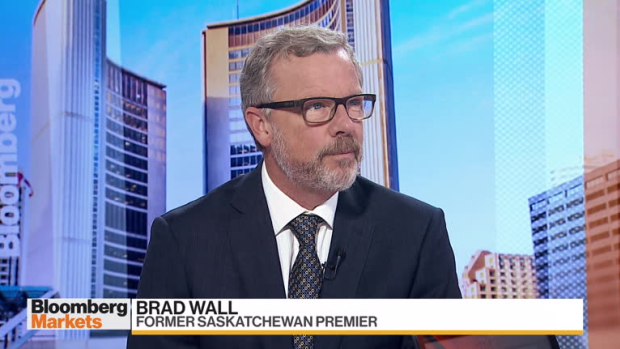Aug 27, 2018
'Who cares what it’s called?': Wall urges Canada forward on NAFTA

Former Saskatchewan premier Brad Wall says it’s time for Canada to get a trade deal done with the United States and Mexico, adding that Donald Trump’s decision to drop the “NAFTA” name ultimately won’t matter in their negotiations.
Canada’s NAFTA counterparts reached a trade agreement Monday, with Trump stating that the NAFTA name would be dropped because it “has a bad connotation.”
Wall said that clinching a trade deal with the U.S. and Mexico matters more than what it’s called.
“Let’s not get hung up on the name,” Wall told BNN Bloomberg in an interview Monday. “Who cares what it’s called, as long as we have a sustainable and beneficial trilateral North American trade deal? … The kind of trade deal that has, I would argue, benefitted all three economies significantly since it was signed.”
Wall said that Canada can get on-side with a lot of the automotive issues that were reportedly settled in the U.S.-Mexico pact, including baseline wages for workers and rule of origin for North American cars.
“I think it’s interesting to look at what’s in the deal today with Mexico and ask ourselves as Canadians if we’ve got a problem with any of those things as it relates to the auto sector,” Wall said.
“I’m not sure there would be an issue with it. So, I hope our federal government moves quickly on this. I think it’s important to be part of the trilateral [agreement].”
As for what Canada could sacrifice to get a deal done, Wall pointed to the Harper government’s willingness to soften on supply management in the dairy sector to reach the Comprehensive Economic and Trade Agreement with Europe.
“If we know Canadians are paying more for cheese and milk and other supply-managed goods than they otherwise would be, and we have a chance for that sector to be supported in transition so it can be as competitive as any in the world, and it gets us to a good deal for Canada in terms of a new NAFTA or whatever it’s going to be called, I don’t think it should be ruled out,” Wall said.
Wall also cautioned that Canada needs to resist what he calls “virtue-signaling,” when it comes to negotiating with their American counterparts.
“Let’s not be tempted, however the federal government might be, about the politics of that sort of virtue-signaling that we’ve seen in other areas,” Wall said, pointing to issues including gender inequality and climate change.
“Let’s get a deal.”





